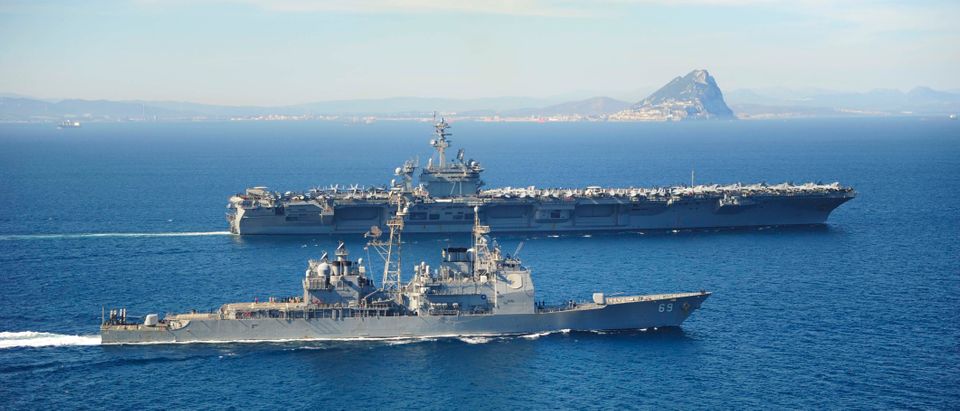The United States Navy remains the greatest naval force on the planet. Yet, the service that is responsible for flying the American flag around the globe seems incapable of avoiding publicly embarrassing situations. The reason — clear to most though many lack the fortitude to both acknowledge and vocalize it — is that the United States Navy is facing an unprecedented crisis in leadership, specifically at the upper echelons of officers and appointed officials.
Just recently, the Navy has suffered major collisions at sea, aircraft crashes, disastrous court proceedings and now the viral infection of the USS Theodore Roosevelt. Beyond the headlines, it is evident to every sailor that there is a deeper cultural issue with Navy leadership — only fathomable and correctable with the selection of a transformational leader to fill the position of Secretary of the Navy.
The president will have to call on the Navy in the coming years as we square off with Russia, Iran and an increasingly aggressive China. Time is running out, and soon it will be too late as we discover we are unprepared because our nation is dependent on a Navy that — after eight years of officer promotions under the Obama administration — is too careerist, too risk-averse, too politically correct and too unfocused.
I love the Navy. The education and experience I had while in the Navy directly and greatly contributed to my success both in and out of uniform. I met most of my closest friends through the service. However, a love for the institution does not blind me to its faults. Instead, it motivates me to help make it better, because our nation and our sailors deserve better. While my defense of Navy SEAL Chief Eddie Gallagher was my most public recent trial, I have represented many service members of different ranks and various warfare communities. I have had the opportunity to see the true state of Navy leadership. I am sad to tell you: it is scary.
Commanders who take decisive action to protect the lives of warriors under their command are punished. Captain Crozier’s case may be the most visible recent example, but it is a common occurrence. Consider the leadership of Strike Fighter Squadron 106, the Navy’s F/A-18 Super Hornet training squadron. They had their careers destroyed for taking decisive action after discovering an unqualified junior aviator was secretly teaching students incorrect, unapproved and dangerous techniques for landing on aircraft carriers.
The culture is particularly bad in the Naval Special Warfare community, where our warfighters have shouldered a heavy load from the War on Terror. They are expected to take on the nation’s deadliest battles and then have their lives and careers ruined if a senior officer becomes worried about appearance. Recent Inspector General complaints revealed that Admiral Green, Commander of Naval Special Warfare Command, chose two well respected and accomplished combat leaders as scapegoats — firing them in an unmistakable effort to protect his own reputation.
Rather than fighting for their people, there are too many incidents of senior Navy officers abusing and discarding their sailors to save their own reputations. Countless people of the highest caliber devote the best years of their life to the Navy, only to see their high-ranking officers betray and throw them away right before they can retire.
The Navy has a historical culture of dishonesty focused on facade rather than the responsibility of fighting well and preserving our strength. For example, rather than inspect the true readiness of a ship, significant advance notice was given so that the ship could employ a variety of methods to hide its true condition. If equipment was broken, it was swapped out with the ship across the pier for inspection day. Careers hung in the balance as commanders were required to focus on concealing the true readiness of the fleet in order to pass inspections.
The fleet is aging, and years of sequestration, smaller budgets, and over utilization have taken a toll. Unfortunately, it took the deaths of 17 sailors and hundreds of millions of dollars of damage to two destroyers to compel the Surface Navy to begin changing their priorities and procedures. No-notice inspections have become the norm, and commanders are not primarily judged on inspection scores, but rather the actions they take to ensure the safety of the ship and crew.
To be sure, there still are several outstanding officers in senior leadership positions and many more who are a few ranks below ready to fill the void, but this type of deep cultural leadership rot can only be eradicated by powerful and aggressive civilian leadership. The last thing that the Navy needs is another bureaucrat of the same mold as the last several SECNAVs, who will emphasize maintaining the status quo and promote continuity over progress, warfighting and the welfare of our fighting men and women.
What the Navy desperately needs is a leader who is not afraid to break conventions in order to give our outstanding sailors and citizens the Navy that they deserve.
Tim Parlatore is a senior fellow at the London Center for Policy Research.












